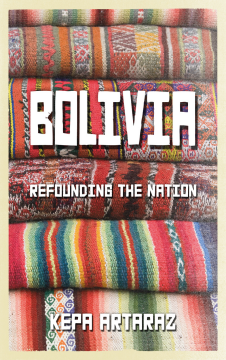
Additional Information
Book Details
Abstract
The election of the Movimiento al Socialismo (MAS) to power in Bolivia in 2006 marked a historic break from centuries of foreign domination and indigenous marginalisation. Evo Morales, leader of the MAS, became the first indigenous president of Bolivia.
Kepa Artaraz looks at the Morales' government's attempt to 'refound the nation'. He shows how the mix of Marxism, indigenous liberation politics, anti-imperialism and environmentalism has made Bolivia one of the most interesting and unique political experiments of Latin America's 'red decade'.
As the historic left-turn in Latin America reaches a crossroads, this book guides us through the politics and ideas which have animated this popular movement, drawing out important lessons for progressive politics everywhere.
'A timely resource for navigating the complex politics of contemporary Bolivia'
Benjamin Dangl, author of The Price of Fire: Resource Wars and Social Movements in Bolivia (2011) and Dancing with Dynamite: Social Movements and States in Latin America (2010).
Table of Contents
| Section Title | Page | Action | Price |
|---|---|---|---|
| COVER | Cover | ||
| Contents | v | ||
| Acknowledgements | vii | ||
| Acronyms and abbreviations | ix | ||
| Map of Bolivia | xiii | ||
| Introduction. Bolivia: Refounding the nation | 1 | ||
| 1. The economic birth pains of poor countries | 13 | ||
| Five hundred years of plunder? | 14 | ||
| Economic liberalism reborn | 19 | ||
| A heavy dose of shock therapy and the bitter pill of structural adjustment | 21 | ||
| The deepening of the neoliberal project | 24 | ||
| The Latin American turn to the left | 30 | ||
| 2. Political failures and political revival | 32 | ||
| The frustrated expectations of the transition to democratic rule: the view from below | 34 | ||
| The frustrated expectations of the transition to democratic rule: the view from above | 40 | ||
| MAS: an alternative political movement | 43 | ||
| A revolutionary period: three key moments | 49 | ||
| Towards the 2005 victory | 52 | ||
| 3. Revolution in democracy? | 55 | ||
| Demanding recognition: the marches for territory and dignity | 56 | ||
| A revolution in democracy or a revolutionary form of democracy? | 63 | ||
| Main pillars of the new Bolivian constitution | 73 | ||
| The challenges ahead | 75 | ||
| 4. New politics: in search of a working relationship between the state and civil society | 78 | ||
| The failure of old politics | 80 | ||
| The emergence of alternative political actors | 82 | ||
| Complexity and contradictions in the relationship between the state and civil society | 92 | ||
| Towards a new polity | 98 | ||
| 5. New citizens, welfare and well-being | 101 | ||
| United in diversity | 103 | ||
| Suma qamaña, or an indigenous understanding of ‘living well’ | 109 | ||
| Welfare, well-being and the role of the state | 111 | ||
| Living well and anti-poverty cash transfers | 114 | ||
| Towards a new definition of the good society | 118 | ||
| 6. New economics: the promise and the limits of post-neoliberal development | 120 | ||
| Towards a new national productive economic model | 123 | ||
| A story of success? | 128 | ||
| The limits of post-neoliberal development | 133 | ||
| 7. Bolivian–US relations: breaking the stranglehold | 139 | ||
| A history of imperialist relations | 141 | ||
| The transition to democracy and the war on drugs | 145 | ||
| Fighting the process of change | 148 | ||
| Unchanging relations and frustrated expectations | 151 | ||
| The end of the Monroe Doctrine? | 154 | ||
| 8. Bolivia’s place in Latin America | 158 | ||
| A Latin American bloc? | 159 | ||
| The emergence of UNASUR | 161 | ||
| A post-neoliberal paradigm | 166 | ||
| ALBA and Bolivia’s social policy | 169 | ||
| ALBA: the future of South–South collaboration? | 173 | ||
| 9. The promise and the limits of a revolution in democracy | 177 | ||
| A bottom-up process of change | 179 | ||
| Obstacles on the path of national rebirth | 181 | ||
| A new direction of travel? | 183 | ||
| Conclusion | 188 | ||
| Notes | 191 | ||
| Index | 229 |
